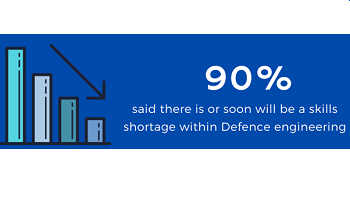
Written by Emma Booth, Defence Engagement Lead, Serco and Defence Suppliers Forum People & Skills Programme Manager
Earlier this year, the Defence Suppliers Forum People & Skills Group launched the 2020 Engineering Skills Survey which assessed attitudes towards engineering across the Defence enterprise.
Given the challenges facing the engineering profession, it’s important that the Defence enterprise seeks to address these issues. We can do this by influencing policy through focused actions based on robust evidence to drive forward tangible change.
The 2020 Engineering Skills Survey has provided that evidence, which includes 458 responses and 20 qualitative interviews with senior leaders and mid-career professionals from across the Defence enterprise.
The following policy priority recommendations are based upon the qualitative and quantitative responses, overarching is the need to have a collaborative and coordinated Defence enterprise approach to effectively influence policies.
Defence Enterprise Demand Signal to Academia
The survey analysis indicated that it is critically important for academia to be delivering on skills requirements and that a demand signal into academia is required to ensure future skill needs are accounted for.
- 86% of respondents believed improved links between the academic sector and employers of engineers would enable more widespread promotion of Defence as a career choice for the engineers of tomorrow.
- This included academic engagement at all levels of education.
- 62% of respondents agreed that there is no apparent workforce plan and holistic demand signal for the Defence engineering enterprise, with 88% of respondents saying that it would be useful to have a coherent strategic workforce plan and holistic demand signal for talent.
- 1/4 of respondents did not know their planning horizons.
Diversity & Inclusion
- 90% of respondents believed there is a national skills shortage within the Defence enterprise.
- A quarter of respondents also identified the perception of gender equality as a barrier preventing people from becoming engineers.
- The wider survey analysis highlighted the need to ensure a wide and diverse talent pool to tackle this skills shortage and did identify that there is a gender and race imbalance within the sector.
- However, more needs to be done more widely to ensure best policy practices across the Defence enterprise to cultivate a Diverse and Inclusive Defence environment, including targeted policy measures to retain, attract and widen the talent pool.
Tackling Negative Perceptions
- An overarching theme throughout the qualitative and quantitative analysis was that there is a perception problem that makes it difficult to attract people.
- ‘Lack of awareness of jobs in the sector’ and ‘unattractive industry’ were cited as top perceived barriers preventing people becoming engineers.
- These perceptions tended to be related to the fact that engineering is seen as a ‘job for the boys’, as well as the moral and ethical perceptions around the Defence sector.
If you are interested in getting involved in any of these policy areas, please contact emma.booth108@mod.gov.uk





